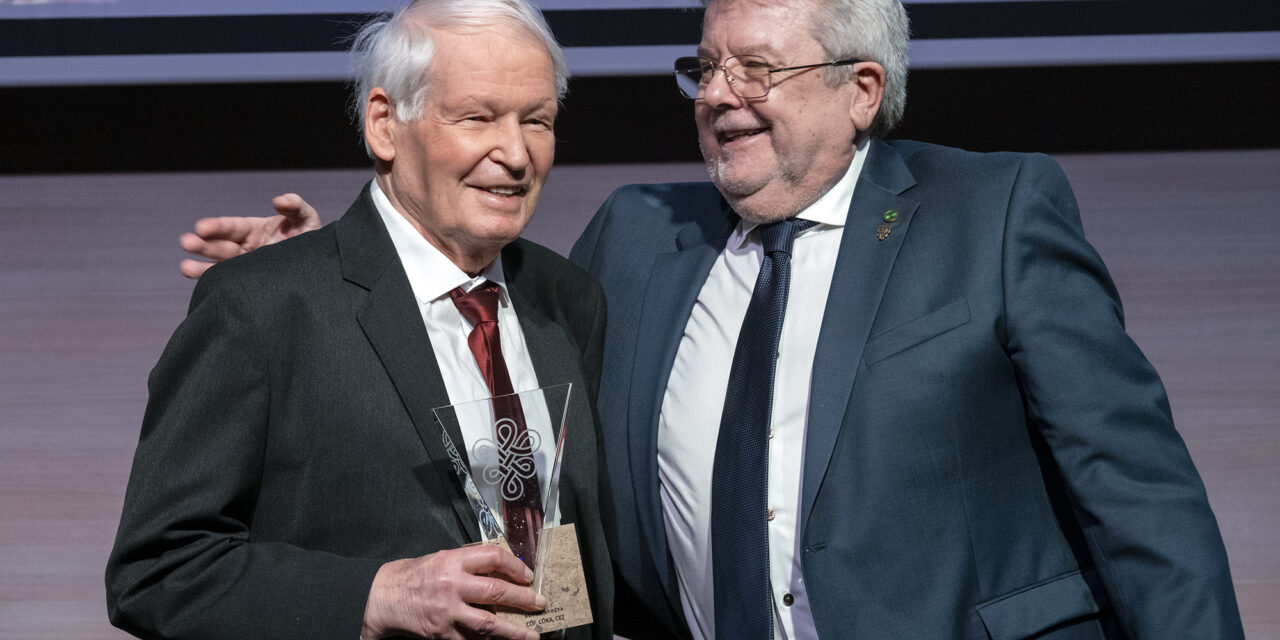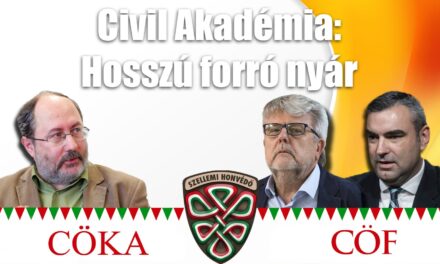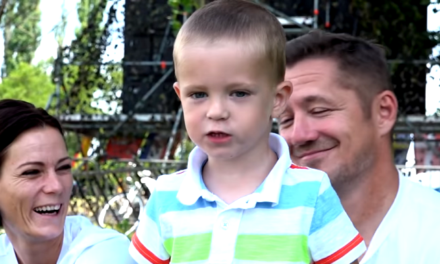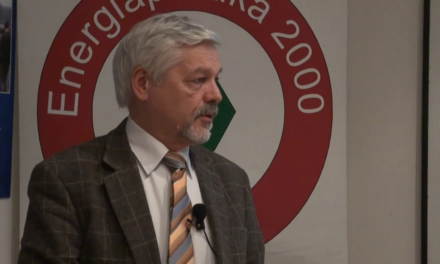It is a rare, or rather unique, event that someone who does not have Hungarian roots becomes a real Hungarian spiritual defender of the country. Konrad Sutarski, a poet, writer and public figure living and creating in our country, nevertheless became a citizen of our country, Christian Hungary, with all his heart, while he did not deny his Polishness either. The work and social involvement of Sutarski, who has now been awarded the Spiritual Defender Award, was praised by Kossuth Prize-winning poet Katalin Mezey in his eulogy.
Konrad Sutarski is a Polish and Hungarian poet and writer who won the Gábor Bethlen and Attila József prizes, who received the Knight's Cross of the Order of the Polish Republic in 2005, the Szent László Prize, the highest honor of the Poles in Hungary, in 2007, and the Hungarian Order of Merit in 2014 Knight's Cross, and in 2016 the Gloria Artis Award for Polish Culture, bronze grade. 1934. was born on September 21 in Poznań, a large city in western Poland called the cradle of Poland. This patinated city, rivaling the antiquity and beauty of Gdansk and Krakow, lies on the banks of the Warta River, on one of whose islands it was built in 968, two years after the symbolic baptism of Poland, the country's first cathedral, presumably Prince Mieszko and his son, who was crowned in 1025 it was the burial place of the first Polish king, Boleslav the Brave. But Poznań's past is not only significant: today it is also an important economic, commercial, scientific and cultural center that can boast of Poland's most famous international fair.
Konrad Sutarski was orphaned at an early age as the son of a Polish officer killed by the Soviets in Katyn. His later, shocking poems painfully recall the tragic memory of his father, who was lost at an early age. After his high school studies, Konrad enrolled in the Faculty of Agricultural Mechanical Engineering at the Technical University of his hometown, where he obtained a mechanical engineering degree in 1958. He obtained his doctorate in agricultural technical sciences in 1969 at Budapest-Gödöllő University, because during a trip to Hungary he fell in love with a Hungarian girl, whom he married in 1962. In 1965, the young couple decided to move to Hungary for a while. Sutarskia started working at the Field Machinery Development Institute, where, among other things, he designed a successful vegetable harvesting machine that won the grand prize at the Budapest International Fair in 1973, and which was manufactured and distributed for a decade in socialist countries. In this connection, he received the gold grade of the "Excellent Inventor" award in 1977, among other significant recognitions.
His career as a poet and writer also began in Poznań: as a member of the 1956 literary generation, in 1956 he co-founded the legendary Wierzbak literary group in Poznań, which organized national poetry festivals between 1957 and 1961 – for the first time in the history of Polish literature. By this time, his poems had already appeared in various literary magazines and anthologies, and his original poetic voice quickly attracted attention. For Sutarski, moving to Hungary was facilitated by the fact that the Wierzbak poetry group ceased operations in the early sixties. But he did not want to be separated either from his country or from Polish literary life: he constantly published poems and Hungarian reports in his home newspapers and literary magazines.
"By the second half of the sixties, I was already involved in the literary life here (in Hungary) (…) In the seventies, thanks to the recommendation of Sándor Csoóri and Sándor Weöres, a volume of my selected poems was also published in Hungary in the New Pegasus series of the Europa Könyvkiadó, which presents world poetry," he recalls later for his second poetic start. Soon he also appeared as a translator of Hungarian poetry. In 1980, he edited, translated and published in Poland the volume of Radnóti's poems in Polish, the volume Csoóri in 1981, and the anthology of post-war Hungarian poetry in 1985. He realized that in Poland the censorial conditions in Hungary were not taken so strictly, thanks to this he was able to present the poems of authors condemned to silence at home to Polish readers. It was more difficult for him to publish Hungarian poets from across the border on Polish soil, and his anthology of their works was finally published only in 1991. A second, expanded edition of this volume was published in 2007 thanks to the work and efforts of Konrad Sutarski as a translator.
During the heroic era of the MDF, he facilitated the building of cross-border relations between Polish and Hungarian democratic circles with national sentiments, in recognition of which he received the honorary diploma of the Hungarian Democratic Forum from the hands of József Antall and Sándor Lezsák in 1990, and in 1994, exactly forty years ago, he became one of the first Hungarian citizens , as it became possible in Poland and Hungary with the introduction of dual citizenship. From 1989, he worked as a Polish diplomat: he was the first director of the Polish Information and Cultural Institute in Budapest after the regime change. Later, he became an employee of the newly established Hungarian cultural TV channel, Duna Televízíó, where he made more than one interesting and topical film about Poland. From 1995 to 1999 and from 2001 to 2007, Konrad Sutarski was the first president of the National Polish Minority Self-Government and was re-elected three times. In this capacity, he founded the Hungarian Polish Museum and Archives in 1998, which has been operating since 2006 as a research center for the 1,000-year-old Polish-Hungarian historical relations. In the beginning, he was the head of the institution, then its director until 2014, when he retired. In recognition of this activity, he received the Pro Cultura Minoritatum Hungariae award in 2013.
An important area of Konrad Sutarski's political and organizational work is that, from 2011, he helped build the friendly relationship between us, i.e. the Forum of Civil Solidarity and the largest Polish civil organization, the Gazeta Polska clubs. The memorable events of this cooperation that brought outstanding results were the annual mutual visits of the two organizations, our joint participation in each other's national holidays and the Peace Marches. The meetings, which brought lasting experiences for all of us, were unfortunately interrupted by the outbreak of the Russian-Ukrainian war.
But Konrad Sutarski's literary, political, and non-professional work as a historian did not stop even in the last busy decades. Moreover, his publications: his thought-provoking articles, volumes of essays and studies have multiplied, as have his books of poetry in Hungarian and Polish. His highly successful book on the history of Poland with Hungarian aspects can be read in both languages. "I feel like a Pole, but also like a Hungarian. These two countries not only love each other, but have acted in defense of Christian Europe for centuries and are still doing so now," he testified about his motivation in an interview. The authenticity of these words is confirmed by our author in 2020 in both Hungarian and Polish " 100 years of Trianon, is Europe's open wound healing yet?" book, which proves that Konrad Sutarski fully meets the criteria of Gyula Illyés, that is, "He who hurts Trianon is a Hungarian" .
In 2021, Mit hozol XXI was published in both countries of Konrad. century? Sutarski's book of poems. "The compilation of the book was motivated by the fact that Europe is less and less preserving its traditional character, and that the Christian faith, especially in Western Europe, is beginning to lose its role as a moral guide," wrote the poet about the driving forces behind his lyrics.
Finally, I would like to conclude my eulogy with a quote: "Let us make it known, (that) the mission of Konrad Sutarski's current volume is to influence Europe and the nations of the world (...) Konrad Sutarski's oeuvre renews the dedicated art that stands for the Good and represents the cause of Man, which today's creators so they are often rejected. (...) The belief in authorship is linked to the Christian symbolism of the Word made flesh, to the symbolic system and values of historical Europe, the signs of which Sutarski wants to pass on to future generations. This is the source of the moral and undisguised teaching intention that is so characteristic of his poetry. It would be difficult for today's readers to accept this sense of authorship if Konrad Sutarski's language were not full of emotions and passionate, post-romantic twists. Warm, inspired sentences, rich in imagination, vivid images, surprising metaphors. All of this causes us to believe what these poems are saying... we come under the influence of the author's intention..." - states the Polish poet, editor and literary critic Jerzy Grupiński about the passionate and inspiring poetry of Konrad Sutarski. Konrad is not resting these days either: he is working on compiling a Polish-Hungarian verse anthology entitled Bells for the Lord's Angel in defense of Christian Europe, which he wants to publish later this year.
It is a great pleasure to be able to welcome Konrad Sutarski, one of this year's winners of the Intellectual Patriot Award, in our ranks, and we can thank him for his tireless creativity, which has enriched Polish and Hungarian literature with more than 60 volumes so far. On this occasion, on behalf of all of us, I would like to congratulate the eternally young artist, who turns 90 this year, and wish him many more fruitful years spent in work and health!
Katalin Mezey
Cover photo: civilek.info
You can watch the award ceremony here:
You can read our exclusive interview with Konrad Sutarski here:













